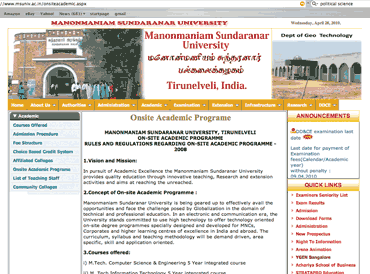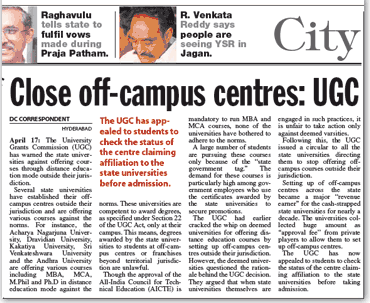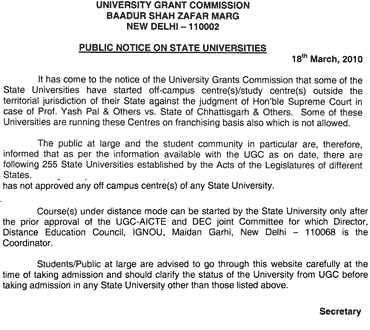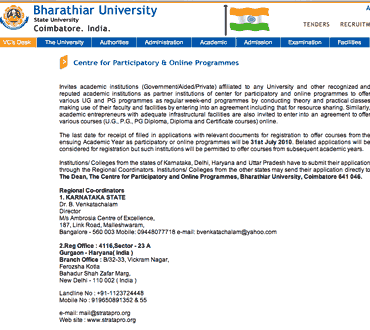
Universities in India have traditionally offered education in two forms -- regular mode and correspondence or distance
learning mode. With the advent of the internet/VSAT technologies some enterprising universities also offered programmes virtually. And one was clear as to what one opted for.
Colleges, if they have to offer a degree, must affiliate themselves to a university and offer courses. Others can only offer a certificate or a diploma, which may or may not be recognised. As long as they offered value to their students, and students were in the clear as to what they were getting into, there should be no problem.
Now a new form of "degree offering" is greeting students
"India's first ever clinical research programme, now also offers a UGC recognised degree" -- screams an advert.
"In addition to our academically superior programme you also become eligiblefor a BBA/MBA from a UGC recognised
NAAC accredited university", says another. "A recognised degree offered in association with a state university" proclaims yet another college.
What is interesting is that none of these institutions call themselves study centres for a distance learning course run by a university. They are also not an affiliated college of a particular university or approved by organisations like AICTE. So how do they offer a regular degree?

A host of cash-starved state universities have begun offering programmes under heads like industry-academia interface, onsite academic partnership, virtual education, participatory programmes collaboration etc. Take the case of Manonmaniam Sundaranar University, Thirunelveli (www.msuuniv.ac.in) a UGC-recognised state university in Tamil Nadu.
Of late, the university has begun offering programmes through "onsite academic partnership" and has approved at least 40 institutions as "onsite" academic partners. Or take the case of Bharatiar University, which has its 'Centre for participatory and online programmes'. It has approved some 48 institutions as partners.
It is this status of 'approved partner' by a univeristy that allows these institutes to masquerade as regular colleges. And the students cannot be expected to realise the intricacies of academic terms like approved, affiliated etc. And the conflict between regulatory agencies comes in handy to the universities willing to bend the law a bit.
What is on offer?
Each of these colleges advertises these programmes as full-time and you are expected to study regular hours, take examinations, do projects, etc. The university designs the curriculum, conducts examination, evaluates your scripts and finally awards you a degree.
You are thus as good as a regular student, and of course, the institute also charges you accordingly. An MBA at these institutes costs upwards of Rs 2.5 lakh. Some even go up to Rs 10 lakh. But the institute is not approved by the state government, there is no AICTE approval and there is no affiliation.

If the universities clearly say that all these colleges are study centres, then the whole thing is legal. But then the institutes only have the status of a tutorial centre. And you will not pay Rs 10 lakh to be tutored for a correspondence MBA degree.
But if they are not just study centres, then the ruling on territorial jurisdiction by the UGC comes into being and the state universities can neither open campuses nor associate themselves with all these colleges outside their jurisdiction. Attempting to bypass this ruling by using terms like onsite partners/ participatory institutions/ academic associates etc, is plain obfuscation of fact and might fall flat on their face one day or the other.
And universities never clearly answer questions on the nature of the programme and the status of these colleges. None of the universities treat these new avatars like "onsite partnerships" as part of their DL institutions. So one can infer that they are not distance learning.
"It is not exactly a distance learning (DL) programme" agrees Dr Sabhapathy Mohan, the vice-chancellor of MS
University. A dean from another university told us off the record that it has to be called a Distance Learning programme only to satisfy the norm. But it is actually a hybrid. Unlike DL, which only has 10 days' contact classes, this
one has regular classes.
It is almost a regular programme, he concluded. In fact, Bharatiar University's website says, "Various UG and PG programmes as regular weekend programmes". So universities are clearly playing around with terms. The law might be irrelevant, stifling and archaic. But unless it is changed the universities must abide by them. Or else it could have disastrous consequences for students the way the Supreme Court judgment on Chattisgarh university case did.
We are not sure that these models are clearly above board. The UGC is very clear on this count. Its recent notification dated March 29, 2010 says so.

Students get a recognised degree (provided there are no legal hurdles): Many of the institutes that have jumped on this bandwagon were earlier offering the students their own diplomas, which was backed only by the institute's credibility. And for sure, students could not use it for higher education or foreign job or public sector jobs. Now at least they will get a recognised degree.
Oversight: For whatever it is worth, there is some oversight over the delivery and evaluation of the programme by the
university. So a student could at least have a limited level of confidence in the programme.
University revenues: For cash-starved universities, the partnership provides them a steady revenue stream.
Non-correspondence degree: If the universities finally manage to overcome regulatory hurdles, for a sizeable section of students who could not get into affiliated colleges, or regular programmes in a university/ approved institute, this offers a compromise solution, albeit at a cost.
Problems with the model
Possible illegality is the biggest hurdle. For institutes which offer these programmes as an add-on or additional benefit,
students end up writing two examinations for each paper every semester or trimester, which is horrible. Most of the universities have appointed third party facilitators.
Archaic rules on education remaining as a not-for-profit entity could turn against them and in the process upset the whole arrangement. No oversight on faculty, infrastructure, fees by the parent university exist in this case. "For the institutes, it is much better than being an approved college. You have no restrictions on the number of students you can admit, nothing on the quality of faculty, and fees charged," says Sivaram Mallela, a former founder of ICFAI group of institutions.
The institutes being a steady revenue stream, there is a conflict of interest. The university makes little or no money
by affiliating a college. But in this new avatar, the fee is 10-20 times higher. Since colleges are not affiliated, they are
outside the normal regulatory regime of the state, even while enjoying the status and privilege of an affiliated college.

It must remove the territorial jurisdiction anomaly. If Harvard can come to India and set up a campus in Chennai, MS University must be allowed to set up a campus in Delhi, either on its own or in partnership.
Institutes must not be allowed to hide behind words like "You become additionally eligible for a foreign degree"; "We are associated with a state university which gives you a degree" and so on. Avoid this regular and distance learning
cocktail.
Any new creative mode of delivery by the approved universities must have prior approval by all the relevant recognising
bodies of the state. And individual institutes offering the same programme must be subjected to same regulatory oversight. Masquerades must be punished swiftly.
What should the student do?
If you are after a recognised degree, go either for an affiliated college or regular institution. If neither of them is within
your reach go for a correspondence MBA, which would cost you Rs 20,000.
The new models may sound good, but they as on date are untested. So apply your mind carefully before joining any of these institutions.
Good teachers and good peer group is what makes a degree from ISB/IIM worth the lakhs you pay. Check if the
institute you opt for gives you both.